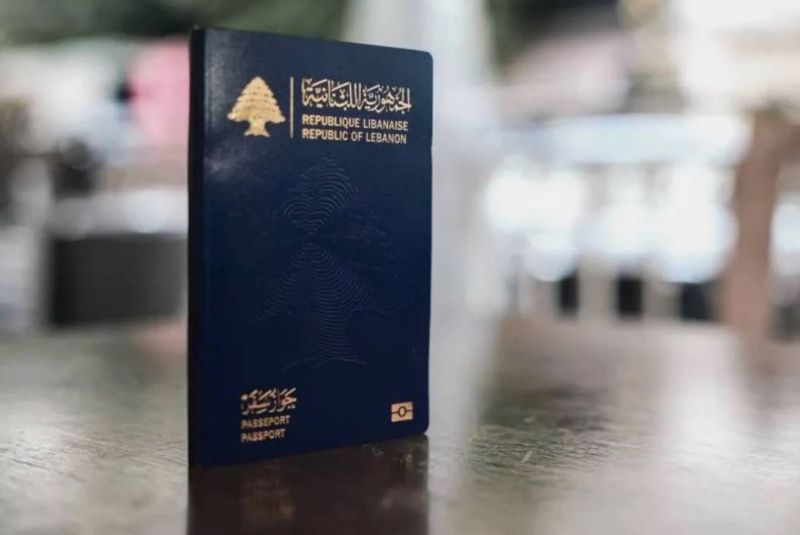
A Lebanese passport. (Credit: Muhammad Yassin/L'Orient-Le Jour/File photo)
As Lebanese tourists and expatriates flock to Beirut airport this summer, the General Security centers find themselves dealing with never-ending queues and an overwhelmed administration.
The demand for travel documents in Lebanon remains high, persisting even after the onset of the economic crisis nearly four years ago. This is despite assurances from General Security that 800,000 passports are ready for printing.
To address the overwhelming demand for passport issuance or renewal, an online platform was established at the beginning of the crisis. However, the waiting time for an appointment on the platform quickly extended to a year or even longer.
Consequently, in response to the influx of Lebanese people accessing the platform and the resulting technical glitches, General Security made the decision earlier this year to close the platform and return to a no-appointment system.
In order to have a passport to escape the worsening crisis in the country, some Lebanese citizens are willing to spend the night camping outside General Security centers. This was precisely the situation last week for Hovig*, 35, who arrived at the General Security office in Beirut’s Sodeco district at 2:30 a.m. to secure an appointment at the office opening hour at 8 a.m.
The first-come, first-served policy remains in place, as only approximately 20 people were granted admission, as reported by Hovig.
“We endured a night of huddling together on the pavement across from the General Security office,” said Hovig. “Around 5 a.m., a policeman arrived to verify if everyone possessed the required documents. He then distributed numbered tokens.”
“At 8:30 a.m., it was finally my turn. I requested an expedited passport since I had an imminent trip planned, but I was informed that there was no guarantee of receiving my new passport within a week. Disheartened, I decided to abandon the process,” he added.
People in urgent need of a passport are resorting to the “urgent passport” option, which is meant to be issued within a week to 10 working days. However, this expedited service comes with an additional cost of LL2,800,000 on top of the standard fee of LL12 million for a regular, second-class passport. In total, this amounts to nearly $160 at the current exchange rate (approximately LL92,000 to the dollar on the parallel market).
Alternatively, if one doesn’t opt for the urgent passport, one must wait for approximately one month to obtain the highly sought-after travel document.
The Lebanese passport ranked 100th out of 199 countries in terms of ease of access, with only 42 destinations exempt from entry visas, according to the latest Henley Passport Index.
30,000 unrecovered passports
Tarek*, a 40-year-old expatriate, took advantage of his vacation time to renew his passport in Marjeyoun, his hometown in southern Lebanon. He arrived at 3:30 a.m. and joined a crowd of approximately 50 other people.
“Only the first 15 people who arrived were granted entry,” he told L’Orient-Le Jour.
Eventually, another 10 people were also allowed inside, making a total of 25 people who successfully completed their paperwork that day. The others were instructed to return the following day. Due to limited capacity, General Security had to prioritize urgent cases, unable to accommodate everyone
The same scenario unfolded for Edgar*, who said that he had to sleep in his car outside the General Security offices in Rayfoun, Kesrouan. Only the first 30 applicants were ultimately admitted.
“I don’t understand why people are rushing to acquire passports,” said a senior General Security official, on condition of anonymity. “As a public administration, we will continue to fulfill our duty of providing travel documents.”
“This irresponsible behavior negatively affects those individuals who really need to have a passport. What sense of security does a passport offer if one lacks concrete travel plans?” the official added, criticizing those who pursue a passport solely for the sake of having it “just in case.”
On the other hand, passport applicants are asserting their fundamental right to obtain a travel document at any given time and are voicing their criticism of the administration’s dysfunction, along with the perceived humiliation they experience.
“It’s unacceptable to have to spend the night outside the General Security office. And even once inside, it feels like things are being done haphazardly, according to the whims of the officials present,” said Hovig. After an unsuccessful attempt, he made another effort the following day at a different General Security office, this time in the Adliyeh sector, hoping to expedite the process.
“Getting inside was impossible. People were jostling each other, and the only employee at the entrance was overwhelmed. I’m willing to pay any amount, but I have no idea where to go or whom to contact,” he said. “This country is becoming unbearable.”
To justify the daily limitation on the number of individuals admitted to each center, the General Security official said, “We have the capacity to issue between 3,000 and 3,500 passports per day, but the demand far exceeds that.”
He further explained that prior to the crisis, General Security used to issue around 800 to 1,000 passports per day.
The official add that, over the course of two years, General Security has already processed 2 million passport orders, including both new applications and renewals. This figure is remarkable for a country with an estimated population of nearly 5 million.
“It’s an astonishing number. People are applying for passports even when they don’t actually need the document and this trend shows no signs of abating,” he said.
Approximately 30,000 passports, some of which have been ready for one or two years, remain uncollected by their owners, according to the official, who emphasized that 80 percent of issued passports have never been utilized.
“We currently have 800,000 passports in reserve, and our printing facilities continue to operate. Furthermore, we are expecting an additional one million passports soon,” he said, without providing a specific date.
*First names have been changed.
This article was originally published in French in L’Orient-Le Jour. Translation by Sahar Ghoussoub.